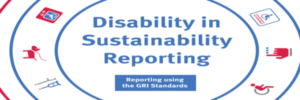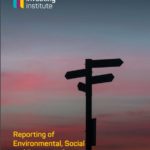
The Guide “Disability in Sustainability Reporting” offers a practical solution to the challenges faced by companies interested in reporting their activities on disability. The tool, developed by Fundación ONCE and Global Reporting Initiative (GRI), with the co-funding of the European Social Fund (ESF), will make it easier to identify what activities can have an impact on the rights of people with disabilities.
Disability is increasingly included in the sustainability strategy of many companies. Why? Including people with disabilities into the workforce represents an opportunity to create added value for the company. Companies such as L´Oréal, IBM and Telefónica shared the positive experience brought about the inclusion of people with disabilities into their business with the participants of the webinar “Disability in Sustainability Reporting”, organized by Fundación ONCE and CSR Europe in the framework of Disability Hub Europe (DHub) on 29 October. Reporting on disability also contributes to showing the company’s commitment to the 2030 Agenda and the Sustainable Development Goals (SDGs), in which people with disabilities are specifically referenced eleven times.
Nevertheless, many companies are still struggling to report the impact of their operations, products, services and business relationships on the rights of people with disabilities. In 2015, Fundación ONCE and Global Reporting Initiative (GRI), together with the co-funding of the European Social Fund (ESF), addressed the issue and developed the guide “Disability in Sustainability Reporting”, now updated.
Companies can use the document as a useful tool to discover how to integrate disability in their non-financial reporting while responding to the current GRI Standards, 2030 Agenda and the SDGs. In the document your company will learn:
How to communicate your organization’s commitment to respecting and promoting the rights of people with disabilities;
What activities can have an impact, whether positive or negative, on the rights of people with disabilities, and which GRI disclosures can be used as the basis for reporting on those impacts;
The business value of disability, as regards both creating inclusive workplaces, as well as taking advantage of the business case of disability for the development of new products, services and physical environments.
Why is reporting on disability relevant for a company? Reporting is important to:
Identify, understand and measure the impact of your activities;
Share with your stakeholders the progress made towards the 2030 Agenda and SDGs;
Align your company to the transparency practices of the EU, such as the Guidelines on non-financial reporting, where disability was explicitly included by the European Commission, and the Spanish Law 11/2018 on non-financial and diversity information – the transposition of the European Directive 2014/95/EU, which defines specific mandatory indicators regarding disability
About the Guide
The guide “Disability in Sustainability Reporting” was last updated in 2019 in the framework of Disability Hub Europe (DHub), a multi-stakeholder engagement initiative led by Fundacion ONCE and co-funded by the ESF. DHub aims at building a reference space to foster the potential of the binomial Disability and Sustainability.



